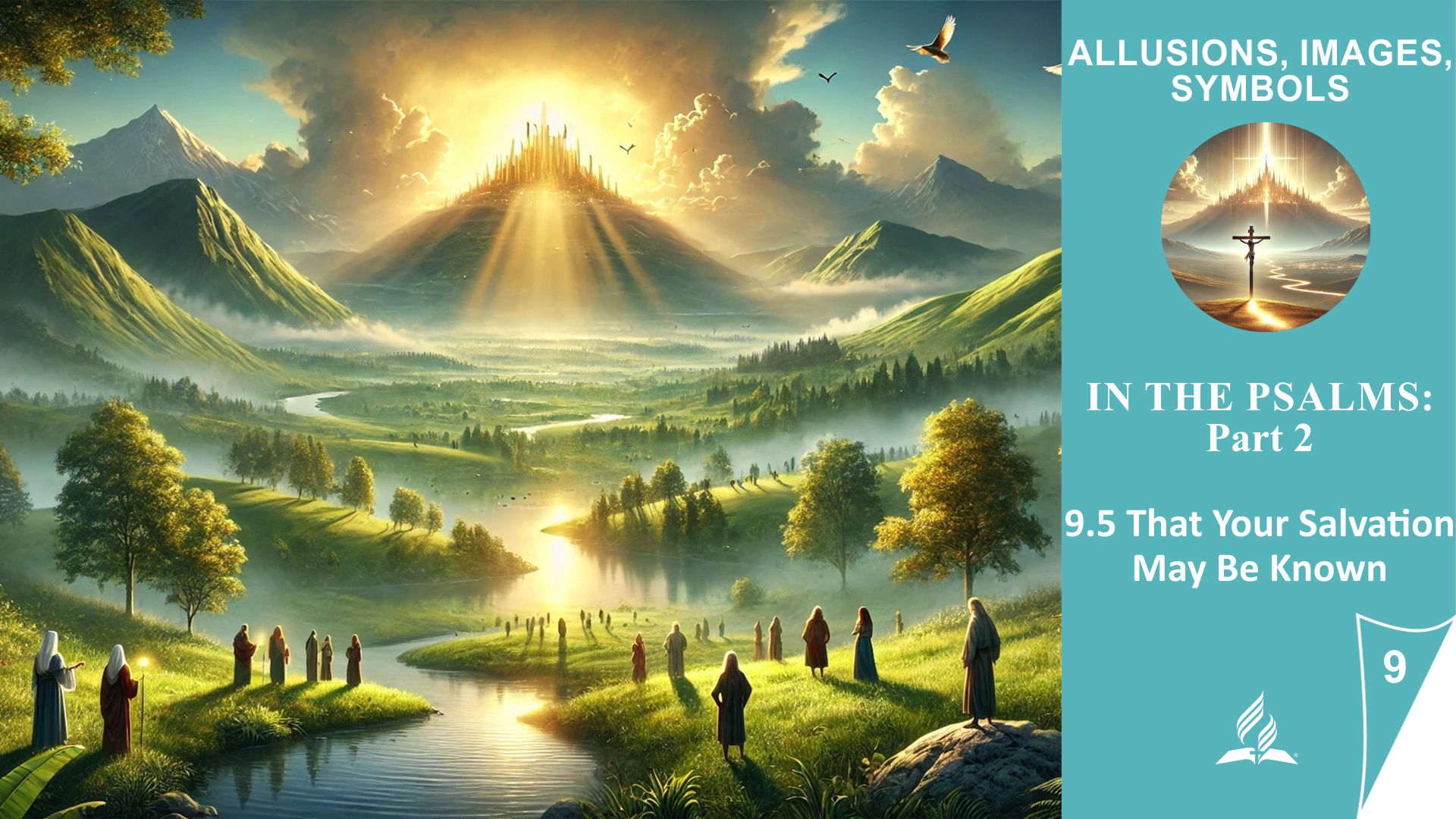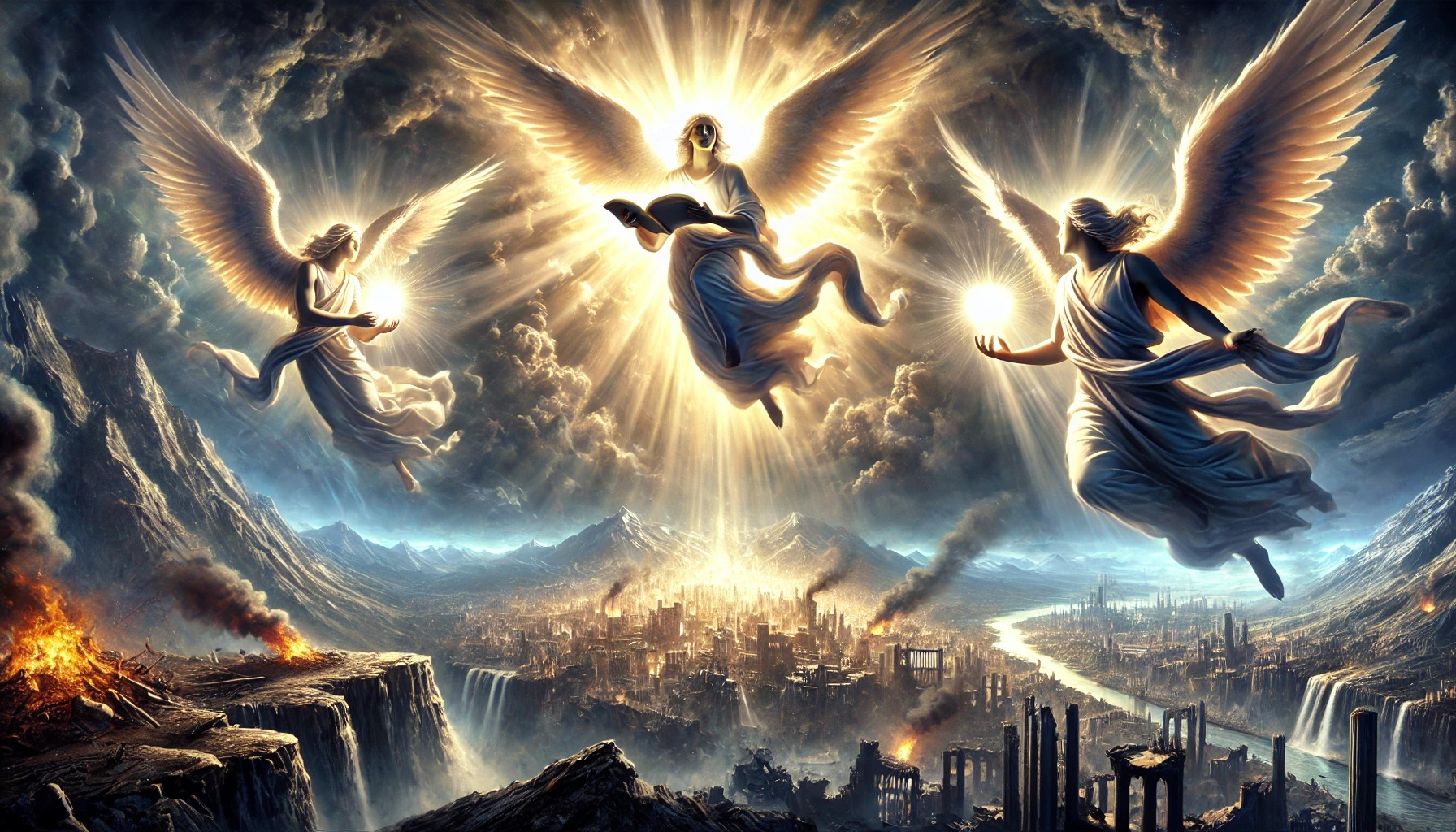


⛪ Lesson 9: In the Psalms, Part 2
📘 9.5 That Your Salvation May Be Known
✨ Radiant Ambassadors of Salvation in a Dark World
………………………………………………………………….
🟦 Introduction
There comes a moment in life when we must decide whether we want to remain mere recipients of God’s light—or become transmitters of it. Psalm 67 is more than a song of praise; it is a missionary call. The light that shines on us is meant to shine through us into the world. In connection with Revelation 14, it becomes clear: God’s people are not called to passively enjoy but to actively radiate. But do we really do that?
………………………………………………………………….
📖 Bible Study – Psalm 67 & Revelation 14:6–12
1. Psalm 67 – A Prayer for the Whole World
“God be merciful to us and bless us, and cause His face to shine upon us—Selah—that Your way may be known on earth, Your salvation among all nations.”
(Psalm 67:1–2)
The psalm begins with a priestly blessing (cf. Numbers 6:24–26).
Purpose: Not just personal comfort, but global impact.
God’s grace is meant to be visible—so that all nations may know Him.
➤ Core message:
God’s light is not exclusive—it is meant for all.
2. Revelation 14:6–12 – The Three Angels’ Messages
“Then I saw another angel flying in the midst of heaven, having the everlasting gospel to preach to those who dwell on the earth…”
(Revelation 14:6)
The church stands with Christ on Mount Zion—not as an elite group, but as ambassadors.
It carries the “three angels’ messages”: judgment, worship of the Creator, warning against the beast.
It is a global movement—not a private club.
➤ Connection to Psalm 67:
The light of the gospel is meant to reach all nations, not just “the chosen ones.”
………………………………………………………………….
📖 Answers to the Questions
📌 Question 1: Read Psalm 67. How does this hymn of praise affect your understanding of the role of God’s people in Revelation 14:6–12?
Psalm 67 shows that God’s blessing was never intended for self-glorification. It is a drive for sharing. Revelation 14 is the practical fulfillment of this idea in the final chapter of earth’s history.
God’s people are not containers—they are channels.
God’s face shines not just upon us—it wants to shine through us.
📌 Question 2: What responsibility should we feel as a church and as individuals when it comes to sharing the truth we so dearly love?
We don’t just have a responsibility—we have a holy calling.
If we know the truth that saves, we cannot remain silent.
It would be like ignoring a fire alarm while others are asleep.
Truth is not a privilege—it’s a mission.
We must ask ourselves:
Am I a bearer of light—or a blocker of light?
How can I make the gospel visible in my surroundings?
………………………………………………………………….
✨ Spiritual Principles
-
God blesses us so we can bless others—not to elevate ourselves, but to reach others.
-
Truth brings obligation—knowledge is not an end in itself; it calls us to responsibility.
-
The church is global—the end-time message is not for a select few, but for every nation.
………………………………………………………………….
🧩 Application in Daily Life
🌍 Mission starts in the everyday: A kind invitation, a deliberate testimony, an active conversation about hope.
🕯 Live visibly: Let your actions reflect your beliefs. Speak truth in love.
📱 Use media: Share faith-filled thoughts on social networks—your light can shine digitally.
🙏 Pray for open doors: Each day ask God, “Lord, show me today who needs Your light.”
………………………………………………………………….
✅ Conclusion
Psalm 67 calls us out: Don’t let God’s light stop with us. Revelation 14 shows how serious this mission is in the end times.
If we’ve seen the light of the gospel, we cannot stay in a dark room.
We must go out—even if it costs us something.
………………………………………………………………….
💭 Thought of the Day
“God caused His face to shine upon you—so that others might find their way to Him in your light.”
………………………………………………………………….
🎨 Illustration – The Light Behind the Wall
Mira slowly pulled on her work shoes. It was early morning, still dark outside—and inside. The nursing home “Evening Peace” lay quiet; only the hum of emergency lights and distant footsteps broke the silence. Every day she came here. Every day it was the same routine—yet something inside her had changed. Subtly. Quietly. Like a flame about to go out.
At the kitchen entrance lay her worn-out Bible. That day, she had read Psalm 67: “that Your way may be known on earth, Your salvation among all nations.” And she had asked herself: How? How will they see God’s salvation if I myself barely feel hope anymore?
Rashid was new. Eighteen, dark eyes, rarely spoke. A refugee from Syria, they told her. He’d been assigned to her. She was to train him. But he had a wall around him, thicker than any armor. Their first meeting, he said only: “I’m not here because I want to be. Just doing what the system says.” Then: “You believe in God, don’t you? Your eyes give you away. I lost Him. In Aleppo.”
She had stayed silent. Not out of fear—but because she knew: such words should not be covered with cheap answers.
A few days later, he met Mr. Bergmann. Room 7. An old Jewish man with a sharp wit and an even sharper sense for people. He looked at Rashid, read the name on his jacket and said: “An Arab washing a Jew—if that’s not divine humor, I don’t know what is.” Rashid had laughed—for the first time. And he stayed.
Week by week, something changed. Barely visible at first—like a tiny crack in the wall. Rashid began asking questions. Observed attentively. Helped a demented man brush his teeth—without being told. He stayed longer than he had to.
One evening after a late shift, he came to Mira. In his hand, a wrinkled paper—Psalm 67.
“I found this in Mr. Bergmann’s room, next to his Bible. I read it… three times. I… I don’t understand everything. But this part… ‘make His face shine upon us’… Do you think… that includes me?”
Mira swallowed. She had asked herself that same question. But now, with Rashid standing there, she felt the light shining through again.
“You know,” she whispered, “I believe even the darkest heart—even the one we’ve painted over in black—can’t block God’s light. It always finds a way.”
A few days later, she found Mr. Bergmann alone. He had grown weaker, but his eyes still burned bright.
“The boy… he’ll bring more light one day than many who claim to already have it,” he said.
On his last day, Rashid sat on the bench in front of the home. Mira joined him. He didn’t speak right away. Then he handed her a note. A poem. His own.
I came with darkness in my eyes,
with rage inside, with no replies.
But words struck me like rays of light—
I think I believe… though not yet in sight.
He looked at her. “I prayed yesterday. Just a short prayer. I said: God, if You’re there, don’t make me just a taker. Make me someone who gives.”
Mira smiled, tears in her eyes. She thought of Revelation 14, the angel flying across the sky to proclaim the gospel. The call to all nations. The light that doesn’t stay for itself.
She laid her hand on his shoulder. “Then go,” she said. “Go and be the light you’ve been looking for.”
A year passed. Rashid no longer worked at the home. He volunteered at a youth center. Told his story. Spoke of shadow. And of light.
Mira stayed. And every morning she read Psalm 67. And she knew: God’s face shines. Not only over the strong—but over those who’ve learned that light shines brightest when it’s shared.




















